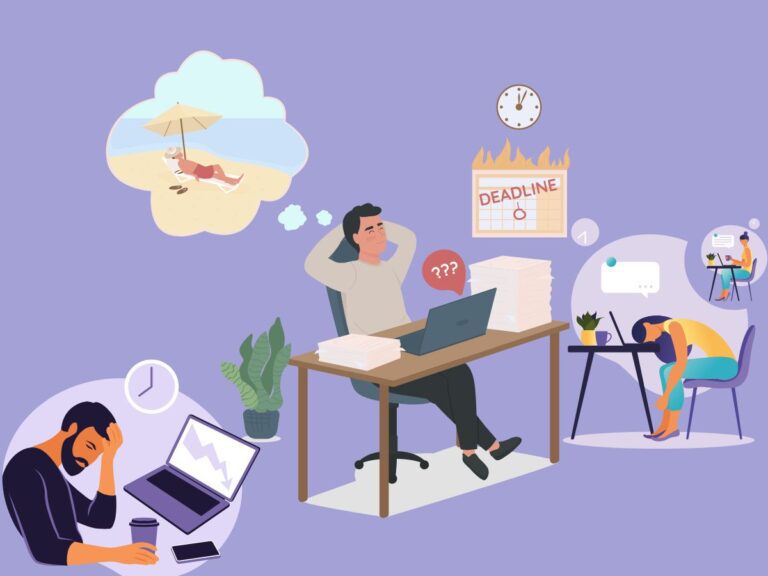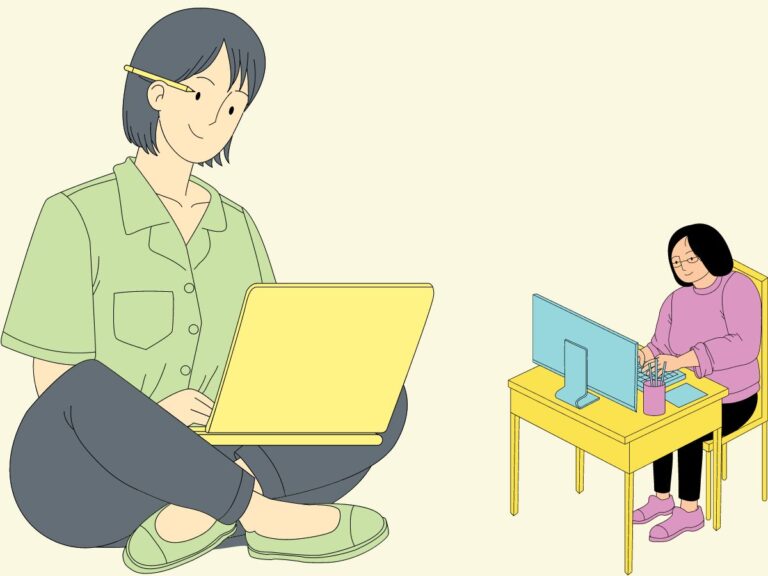How To Stay Focused, 10 Tips To Staying Focus
There are several strategies you can use to stay focused, including:
- Setting clear and specific goals for yourself.
- Breaking larger tasks into smaller, more manageable chunks.
- Eliminating distractions, such as turning off your phone or closing unnecessary tabs on your computer.
- Using tools like the Pomodoro technique to help you stay on task for shorter periods.
- Prioritizing your tasks and focusing on the most important ones first.
- Taking breaks as needed and engaging in activities that help you relax and recharge.
- Staying organized and keeping a calendar or to-do list to help you stay on track.
- Exercising regularly and eating a healthy diet can help improve your overall focus and concentration.
- Getting enough sleep, as a lack of sleep, can significantly affect your focus.
- Practice mindfulness or meditation to be more aware of your thoughts and emotions and to be able to manage them better.
Finding the best methods for you and implementing them consistently is essential. Remember that it takes time to form new habits, so don’t get discouraged if you find it hard to focus.
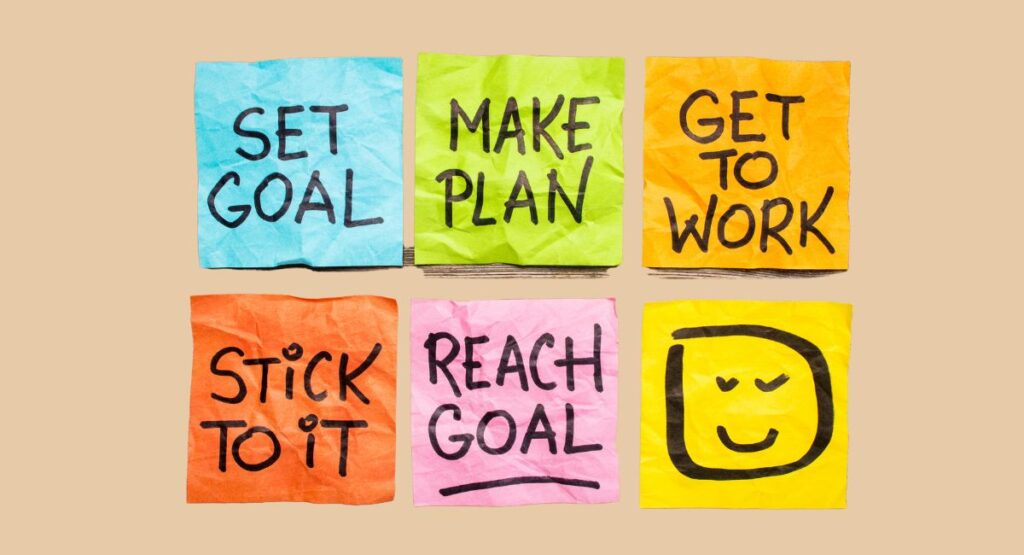
Set specific goals for yourself and work towards them one at a time.
Setting specific goals can help you stay focused by giving you something concrete to work towards. When you have a clear plan, staying motivated and avoiding getting sidetracked by unrelated tasks can be effortless.
These are some steps you can follow to set specific goals for yourself:
1. Identify the task you want to accomplish. Be as straightforward as possible.
2. Break the task down into smaller, more manageable steps. This will make it easier to track your progress and stay motivated.
3. Set deadlines for each step. This helps you stay on track and ensure that you are making progress toward your goal.
4. Create a plan of action. This should include a list of tasks you need to complete and a timeline for achieving them.
By setting specific goals and working towards them one at a time, you can stay focused and avoid getting sidetracked by unrelated tasks. It can also help you feel a sense of accomplishment as you progress toward your goals.

Eliminate distractions.
This may mean closing unnecessary browser tabs, silencing your phone, or finding a quiet workplace.
Eliminating distractions is an essential step in helping you stay focused. Distractions can come in many forms, such as phone notifications, emails, or even idle thoughts. You can create a more conducive environment for focusing on your work by eliminating as many distractions as possible.
Here are a few steps you can take to eliminate distractions:
1. Close unnecessary browser tabs or apps. If you are working on a specific task, close any tabs or apps that are not related to that task.
2. Silence your phone or put it in another room. This will help you avoid getting distracted by notifications or calls.
3. Find a quiet place to work. If you are easily distracted by noise, try to find a quiet place to work, such as a library or a secluded corner of your office.
4. Set boundaries with coworkers or family members. Tell them you are working and need to focus and ask them not to disturb you unless it is an emergency.
By eliminating distractions, you can create a more focused environment that will help you get more work done.

Take breaks regularly.
Taking breaks can be a vital part of maintaining focus and productivity. When you work for long periods without a break, your brain can become fatigued, and you may start to lose focus. Regular intervals can prevent this by giving your brain a chance to rest and recharge.
These are a few different ways to take breaks:
1. Step away from your work. Get up from your desk, stretch, walk around the office or go outside for some fresh air.
2. Do something unrelated to work. This could be as simple as chatting with colleagues or playing a quick game.
3. Use relaxation techniques. This could include deep breathing exercises, meditation, or even just closing your eyes and resting for a few minutes.
4. Take a nap. If you are feeling exhausted, a short rest can be an effective way to recharge your batteries.
By taking
breaks regularly, you can keep your brain fresh and focused, which can
ultimately lead to increased productivity. Just be sure to keep your breaks
short and focused, as taking too long of a break can actually decrease your productivity.
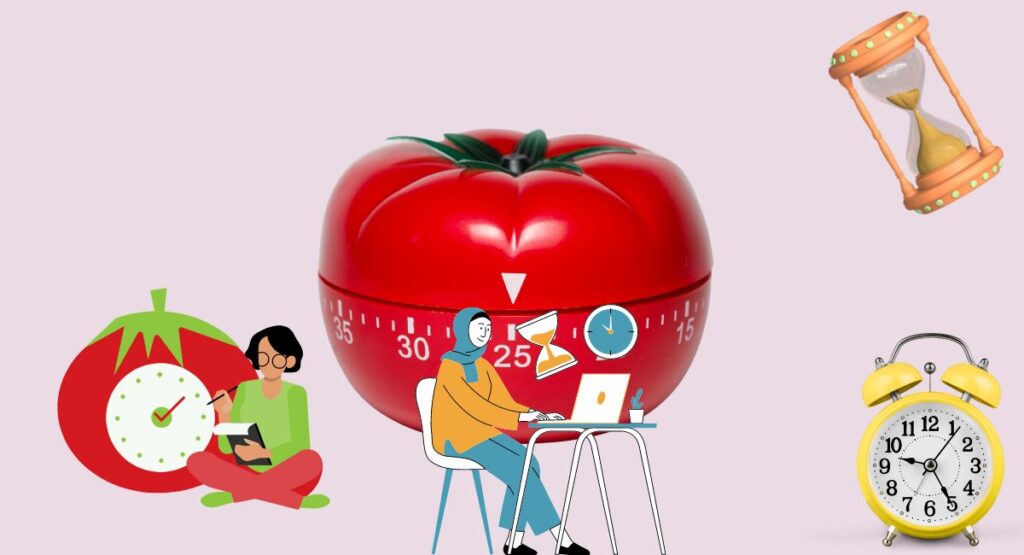
Use the Pomodoro technique.
This entails working for 25 minutes and then taking a 5-minute break. Repeat this cycle a few times, and then take a more extended break.
The Pomodoro technique is a time management practice that can help you stay focused and increase productivity. It involves working in short bursts, with regular breaks in between. Here’s how it works:
- Choose a task to work on.
- Set a timer for 25 minutes (called a “Pomodoro”).
- Work on the task for the full 25 minutes without any distractions.
- When the timer goes off, take a 5-minute break.
- Repeat this cycle a few times, and then take a more extended break (usually 15-30 minutes).
The Pomodoro technique will help you stay focused effectively because it breaks your work into manageable chunks. You can maintain your focus and avoid burnout by working in short bursts. The breaks also give you a chance to rest and recharge, which can help you stay fresh and focused throughout the day.
It’s important to note that the Pomodoro technique may only work for some, and you may need to adjust the length of the work and break intervals to find what works best for you. Experiment with different combinations to see what works best for you.

Try to minimize multitasking.
Multitasking is the practice of working on multiple tasks at the same time. While it may seem like an excellent way to get more done in less time, research has shown that multitasking can decrease productivity and make it harder to focus on any task.
Here are a few reasons why multitasking can be detrimental to productivity:
1. It takes time to switch between tasks. Every time you switch between tasks, your brain has to stop working on one task and start working on another. This process, known as task switching, can take a significant amount of time and lead to a phenomenon known as “attention residue,” where your brain is still partially focused on the previous task.
2. It can lead to mistakes. When you multitask, you cannot give your full attention to any task, leading to mistakes and errors.
3. It can cause mental fatigue. Multitasking can be mentally exhausting, as your brain is constantly switching between tasks and trying to keep track of multiple sets of information. This can lead to mental fatigue and a decrease in productivity.
To minimize multitasking, try to focus on one task at a time. If you need to work on multiple tasks, try to work on them in blocks of time rather than trying to do them all at once. This can help you stay focused and increase your productivity.
Get enough sleep. Lack of sleep will affect your ability to focus and concentrate.
Getting enough sleep is crucial for maintaining focus and concentration. When you don’t get enough sleep, paying attention, processing information, and making decisions can be more challenging. This can affect your productivity and overall performance.
Here are a few ways that lack of sleep can impact your ability to focus and concentrate:
1. It can cause fatigue. Staying awake and focused on a task can be more problematic when you are tired.
2. It can impair memory. Lack of sleep affects your ability to remember new information and retrieve stored memories.
3. It can affect your mood. Lack of sleep can lead to irritability, moodiness, and difficulty regulating emotions, affecting concentration.
To get enough sleep, it’s crucial to establish a regular sleep schedule and aim for 7-9 hours of sleep per night. You should also create a relaxing bedtime routine, avoid screens before bedtime, and create a comfortable sleep environment. Getting enough sleep can help improve your ability to focus and concentrate.

Try using a focus aid, such as white noise or a fidget toy, to help you stay on task.
A focus aid can help you stay focused on a task by providing a simple distraction or helping to block out other distractions. There is a variety of focus aids that you can try, including:
1. White noise: Listening to white noise, such as the sound of rain or a fan, can help to block out other distractions and create a more focused environment.
2. Fidget toy: A fidget toy, such as a stress ball or a fidget spinner, can provide a simple distraction that can help to keep your mind from wandering.
3. Music: Listening to music can help to block out other distractions and create a more focused environment. Some people find that certain types of music, such as classical or instrumental music, are beneficial for focusing.
4. Noise-cancelling headphones: Noise-cancelling headphones can help to block out external distractions and create a more focused environment.
5. Aromatherapy: Certain scents, such as peppermint or lavender, have a calming effect and help to improve focus and concentration.
It’s essential to find a focus aid that works for you. Although this works for someone else, it may
not work for another, so it may take trial and error to find what works best for you.
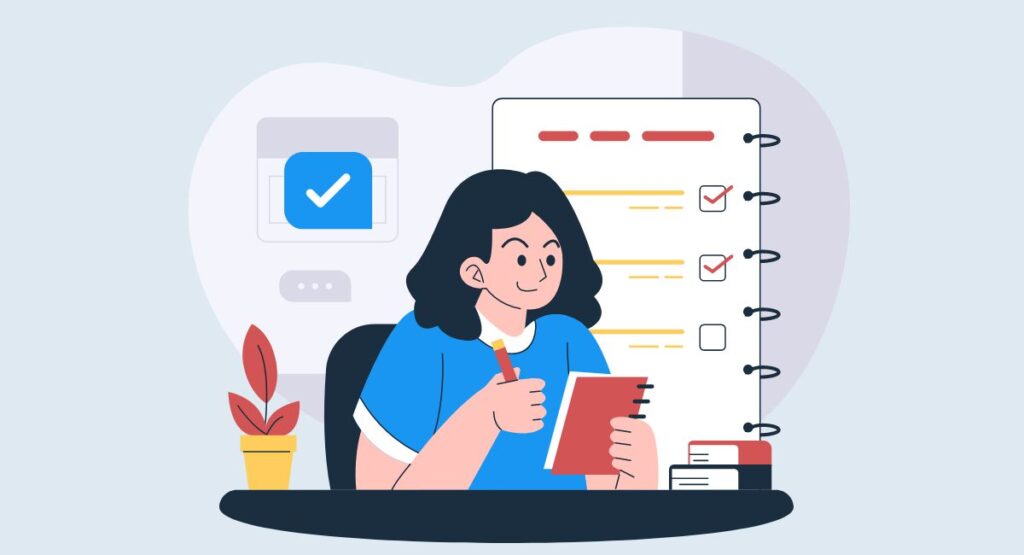
Staying organized and keeping a calendar or to-do list to help you stay on track.
Staying organized is an essential aspect of staying focused. One way to do this is to keep a calendar or to-do list to help you stay on track and manage your time more effectively.
A calendar can be used to plan your day, week, or month and help keep track of appointments, meetings, and other important events. You can also use a calendar to schedule time for specific tasks or projects to stay on top of your priorities and meet deadlines.
A to-do list can be used to keep track of specific tasks that need to be completed and can help break down larger projects into smaller, more manageable steps. To-do lists can prioritize tasks and focus on the most important ones while also providing a sense of accomplishment as you check items off the list.
When using a calendar and to-do list, reviewing them regularly and adjusting as needed can be helpful. It’s essential to be realistic about how much time you have available and to schedule accordingly. This will help you avoid feeling overwhelmed or stressed and will help you stay focused on the most critical tasks.
Additionally, keeping your workspace clean and tidy can make it easier to focus. Avoid having items on your desktop or in your office that are unnecessary to the task at hand. Those can divert your attention from the task you need to focus on.
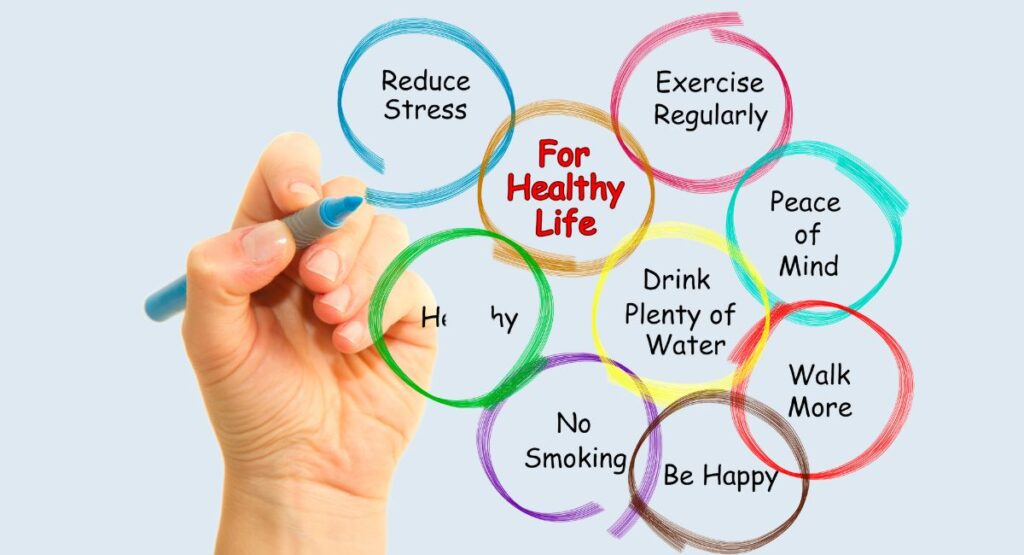
Exercising regularly and eating a healthy diet can improve your focus and concentration.
Exercising regularly and eating a healthy diet are essential to maintaining focus and concentration.
Exercise can help improve focus and concentration by increasing blood flow to the brain, releasing endorphins (feel-good chemicals in the brain), and helping to reduce stress levels. Regular physical activity can also improve sleep, which is crucial for focus and concentration. The key is to find an activity you enjoy and can sustain over time.
A healthy diet can also play a key role in maintaining good focus and concentration. A diet rich in fruits, vegetables, lean protein, and healthy fats can help support brain function and improve overall mental health.
Eating a well-balanced diet can help sustain energy levels and a clear mind throughout the day. Eating small, regular meals and snacks can also help prevent blood sugar crashes that can cause energy to plummet and attention to wane.
It’s also important to stay hydrated, as dehydration can negatively affect focus and concentration. Drink water and limit your intake of drinks high in sugar, caffeine, and artificial ingredients.
It’s important to note that everyone is different and may have specific dietary needs. You should talk to your healthcare provider or a dietitian to determine the best diet.
Remember that forming healthy habits takes time, and you must be patient with yourself as you work towards making exercise and healthy eating a regular part of your routine.
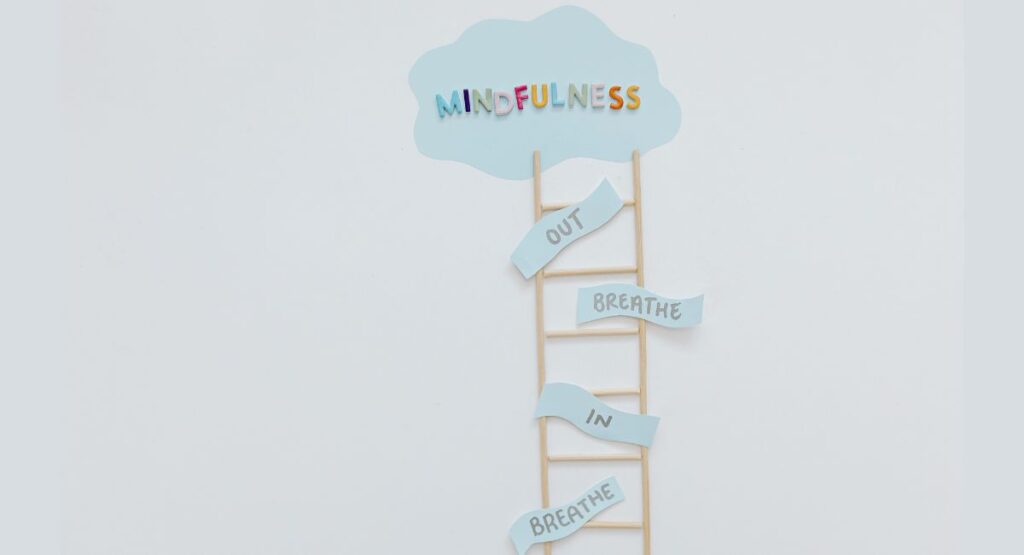
Practice mindfulness or meditation to be more aware of your thoughts and emotions and to be able to manage them better.
Practicing mindfulness or meditation can be a powerful way to improve focus and concentration by helping you be more aware of your thoughts and emotions and to be able to manage them better.
Mindfulness is the practice of being present at the moment and fully engaged in what you are doing. This can help you to focus your attention and reduce distractions. Mindfulness techniques include deep breathing, concentration on your senses, and mindful walks.
Meditation, on the other hand, is a mental practice that involves focusing your attention and eliminating the stream of thoughts that may be crowding your mind. This can help to reduce stress and improve overall well-being. There are various forms of meditation, including guided, movement, and concentration.
Both mindfulness and meditation can help to improve focus and concentration by reducing distractions and increasing awareness and attention span. As you practice these techniques, you can better identify and manage your thoughts and emotions, which can help you stay more focused on the task at hand.
You can find guided meditations or mindfulness exercises online, via apps, or from instructional books. You can start with a small amount of time and gradually increase.
Remember that, like other habits, practicing mindfulness and meditation takes time and patience to become regular. But with time, you may find that it becomes an easy, automatic practice that you can incorporate into your daily routine.
Here is a summary of the techniques I mentioned for staying focused:
- Set specific goals and work towards them one at a time.
- Eliminate distractions by closing unnecessary browser tabs, silencing your phone, and finding a quiet place to work.
- Take breaks regularly to give your brain a chance to rest and recharge.
- Using the Pomodoro technique to work in short bursts with regular breaks in between.
- Minimize multitasking by focusing on one task at a time.
- Get enough sleep to improve your ability to focus and concentrate.
- Try using a focus aid, such as white noise or a fidget toy, to help you stay on task.
- Staying organized and keeping a calendar or to-do list to help you stay on track.
- Exercising regularly and eating a healthy diet can improve your focus and concentration.
- Practice mindfulness or meditation to be more aware of your thoughts and emotions and to be able to manage them better.
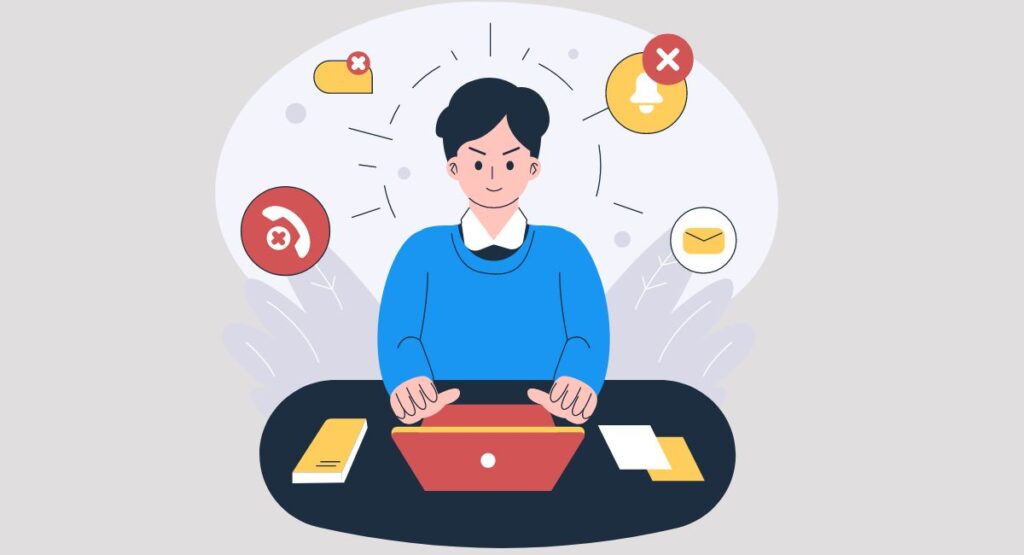
In conclusion, staying focused is an essential skill that helps you be more productive and achieve your goals. You can try various techniques to help you stay focused, including setting specific goals, eliminating distractions, taking breaks, using the Pomodoro technique, minimizing multitasking, getting enough sleep, and using focus aids.
Experiment with different methods and find what works best for you. You can improve your productivity and get more done by staying focused and minimizing distractions.
I hope these tips are helpful! If you have any question or comment, doesn’t hesitate to leave these in the section below.


